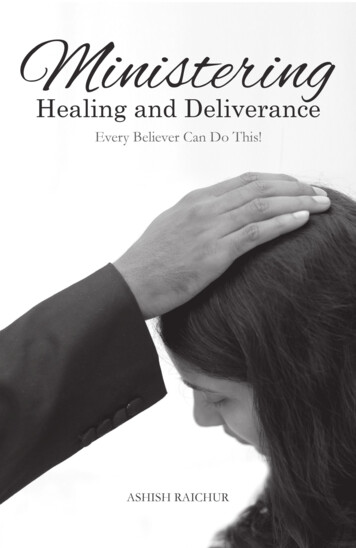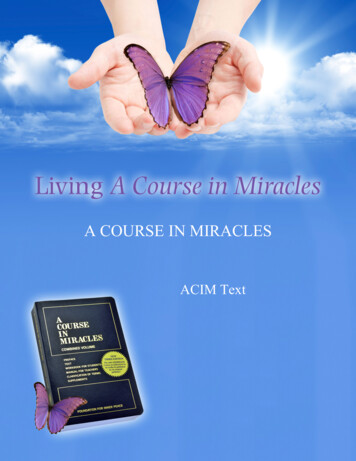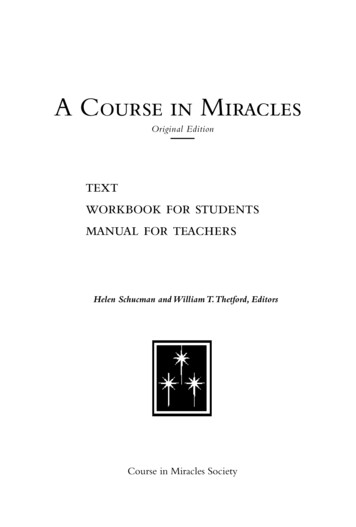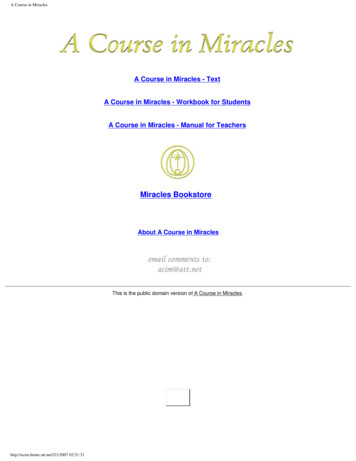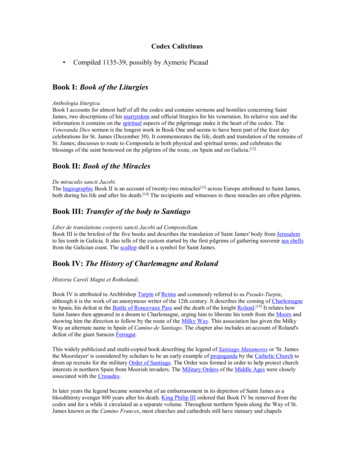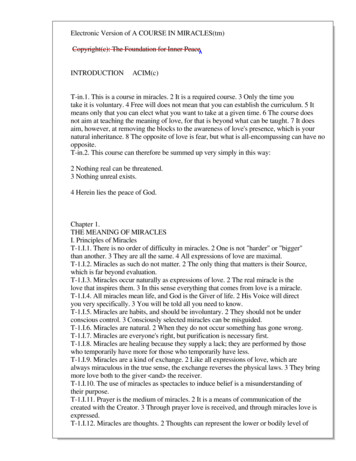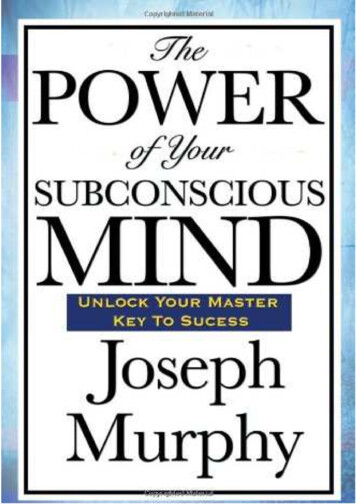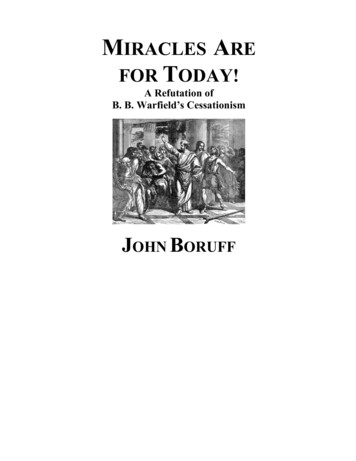
Transcription
MIRACLES AREFOR TODAY!A Refutation ofB. B. Warfield’s CessationismJOHN BORUFF
Unless noted, all Bible quotes in this book are taken from TheHoly Bible, New International Version, International BibleSociety 1973, 1978, 1984. Used by permission.Verses marked KJV are taken from the King James Version ofthe Bible.Verses marked NKJV are taken from The Holy Bible, New KingJames Version, Thomas Nelson, Inc. 1982. Used by permission.Cover Art:W. J. Linton’s Peter and John Heal a Lame ManE-Mail: johnboruff146@gmail.comWebsite: wesleygospel.comMIRACLES ARE FOR TODAY!A REFUTATION OF B. B. WARFIELD’S CESSATIONISMCopyright 2019 by John BoruffTrue Life PublishingAtlanta, Georgia2
You do not lack any spiritual gift as you eagerly wait forour Lord Jesus Christ to be revealed. He will also keepyou firm to the end, so that you will be blameless on theday of our Lord Jesus Christ.–1 Corinthians 1:7-8–In memory of John Wesley, and all charismatic theologians who have followed in his footsteps; and have boldlymaintained that the miraculous gifts have always continued; and are available today.3
CONTENTSIntroduction .51. Warfield Doubted the Scriptures.122. Warfield Rejected Historical Miracles .273. Warfield’s Cessationist Views.42Further Reading.634
INTRODUCTIONIn the year 1918, the Princeton theologian B. B. Warfieldpublished Counterfeit Miracles, which has been consideredby conservative evangelical theologians to be the numberone argument against the miraculous gifts of the Spirit operating after the Bible was written. John MacArthur and anumber of modern cessationists look back to this book asthe heroic modus operandi for upholding the sufficiency ofScripture and slamming down all claims of charismatic andPentecostal miracles. Chapter 6 is about the Christian Science cult; and is mainly designed to expose its strange doctrines. But as will be seen, Warfield did believe in natural or“mental” healings for mild psychosomatic illnesses: andthat is all that Christian Science really taught about healing.My pro-charismatic responses below, are in reaction toquotes from Warfield that I’ve taken mainly from the firstfive chapters, which I have arranged under three subjectheadings: Part 1: Warfield Doubted the Scriptures Part 2: Warfield Rejected Historical Miracles Part 3: Warfield’s Cessationist Views5
As it is not possible to arrive at a cessationist view withoutfirst cutting out the charismatic testimonies of Scripture andchurch history, it seemed reasonable for me to order my material in this way. In the evangelical and charismatic traditions of John Wesley, Thomas Church, A. J. Gordon, Donald Gee, Jack Deere, Jon Ruthven, and Michael Brown, Iseek to present my humble attempt at refuting this giant ofcessationism. Although all of these men have been influences, I’ve relied the most heavily on Jon Ruthven’s On theCessation of the Charismata for some of my responses toWarfield’s interpretations of Scripture. His is the most thorough and academic charismatic response to CounterfeitMiracles to date; and I am ready to admit that it far outshinesmy refutation in its scholarly detail. I’m also ready to saythat Jack Deere’s Surprised by the Power of the Spirit, particularly chs. 9 and 10 and Appendices A, B, and C havehelped me in this way in the past year. John MacArthur’slatest cessationist publication of Strange Fire in 2013 andthe conference that followed it; and the controversy that itcaused, followed up by Michael Brown’s Authentic Fire in2015 as a charismatic response, is what eventually gave wayto me spending some time on this. Ever since I heard of cessationism in college, roughly around 2006 or so, I havewanted to refute it on a theological level, but I didn’t thinkI was ready. This is my second attempt at doing so. I wrotean article on wesleygospel.com back in 2016, which is ti6
tled, “Debunking Cessationism.” I plan on writing other refutations of cessationism in the future, God willing.I’d like to mention some of the influences on Warfield’scessationism. He quotes from many people in CounterfeitMiracles, and unless you are paying close attention, youmight not be able to catch his main influences. But as Ruthven points out, and as Warfield makes totally clear in ch. 1,his main influence is Conyers Middleton’s A Free Inquiryinto the Miraculous Powers (1749). Middleton was reputedly a Deist and definitely skeptical and rationalistic in tone.He was a contemporary of Wesley, and as such received avery thorough charismatic reply from him in “A Letter tothe Reverend Dr. Conyers Middleton,” which mainly consisted of saying that Middleton only expressed a rationalistic skepticism in his book, and thoroughly lacked proof formost of his assertions. Warfield was also heavily influencedby rationalism. Ruthven shows that Princeton Universityhad a long tradition of Presbyterian professors that were influenced by Scottish Common Sense realism,1 somethingthat was in one way or another influenced by the philosopher David Hume. For those who aren’t all that familiarwith philosophy, Hume is a hero for atheists, agnostics, andskeptics; and was one of the top philosophers of Enlightenment era rationalism. He had written “Of Miracles,” ch. 10in An Enquiry Concerning Human Understanding (1748),1Jon Ruthven, On the Cessation of the Charismata (Sheffield, UK: University of Sheffield Academic Press, 2008), pp. 35-36.7
which was published only one year before Middleton’swork. Lastly, Warfield had positive views of many conclusions drawn by Adolf von Harnack, a German higher criticand total disbeliever in the miracles of the Bible. Warfieldeven spent a year studying theology in Germany during thehigher criticism movement, so he could come back to America and refute it. But unfortunately, he came back more influenced by them than he intended. This might help to makesense of why Warfield, reputedly a “conservative” theologian, can easily explain away certain Scriptures like Mark16:9-20 and James 5:14-15, which are essential to the charismatic position. Warfield was not as conservative as peoplemay assume! Under close examination, we can see evidenceof Deism, rationalism, skepticism, and even liberalism in histhinking. Common dictionary definitions of these wordsmight be helpful: Deism - The belief that there is a creator God, but thatGod does not intervene in human affairs. The acceptanceof the idea of a creator based on reason or the idea of intelligent design, but nothing more; it is not the God of theBible. Rationalism - The belief that certainty of knowledge canonly be arrived at through reasoning things out intellectually. It rejects the idea of supernatural revelation through8
visions, dreams, and other paranormal or religious experiences. Skepticism - The belief that certainty of knowledge isimpossible to arrive at, even with the use of intellectualreason, although it tends to favor a rationalistic approach;a skeptical attitude; always doubting the truth of something. Liberalism (theology) - Also known as liberal Christianity; it is generally the view that Christianity has to bemodified by modern science and rationalism in order to beintellectually honest. The Bible is reinterpreted throughthese views; and usually results in a “pick and choose”approach towards Biblical doctrines, and a rejection of themiracles of the Bible. It is mainly a Protestant movementbut has influenced the Catholic Church as well.The Miraculous Gifts DefinedBefore we enter into this study, it would be good to definewhat the miraculous gifts are. They are mentioned in 1 Corinthians 12:8-10:To one is given the word of wisdom through theSpirit, to another the word of knowledge through the9
same Spirit, to another faith by the same Spirit, to another gifts of healings by the same Spirit, to anotherthe working of miracles, to another prophecy, to another discerning of spirits, to another different kindsof tongues, to another the interpretation of tongues.I think these gifts have been adequately defined by bothDonald Gee’s Concerning Spiritual Gifts and HowardCarter’s Spiritual Gifts and Their Operation. I side withCarter on his view of the “word of knowledge,” that it is asupernatural revelation of facts. But between both Gee andCarter, you can find some very thorough definitions of thefunctions of these miraculous gifts. I feel that they complement one another. Smith Wigglesworth’s Ever IncreasingFaith can provide further insights as well. Wesley felt, thatin his debate with Middleton, some more plainness ofspeech needed to be used in the definition of these gifts.2 So,he broke them down another way, although he just viewedit as restating the gifts mentioned in Mark 16:17-18; Acts2:16-17; and 1 Corinthians 12:8-10:1. Casting out devils: 2. Speaking with new tongues:3. Escaping dangers, in which otherwise they must2John Wesley, “A Letter to the Reverend Dr. Conyers Middleton,” TheWorks of John Wesley, vol. 10, 3rd ed., p. 16.10
have perished: 4. Healing the sick: 5. Prophecy, foretelling things to come: 6. Visions: 7. Divine dreams:And, 8. Discerning of spirits.11
PART 1:WARFIELD DOUBTEDTHE SCRIPTURESWarfield Admitted His CessationismWas Not BiblicalOf this we may make sure on the ground both of principle and of fact; that is to say both under the guidance of the New Testament teaching as to their originand nature, and on the credit of the testimony of laterages as to their cessation.It will be sufficiently intimated in the criticism which I purpose to make.3This is an important quote to consider when examining hiscessationist philosophy, because that’s what it is. It’s moreof a philosophy than a theological exegesis of Scripture.Warfield admits that he relies on the New Testament for hisunderstanding of miraculous gifts: so far as it pertains to“their origin and nature.” But when it comes to the cessation of miraculous gifts, Warfield here admits that HE ISNOT RELYING ON THE BIBLE, but on his criticism of“the testimony of later ages,” that is, the writings of the3B. B. Warfield, Counterfeit Miracles (New York: Charles Scribner’sSons, 1918), p. 6.12
church fathers. Any of the church fathers who were charismatic, or who wrote favorably of the Desert Fathers, or othermystic saints--Athanasius, Jerome, Sulpitius Severus, Irenaeus, Tertullian, and even Augustine--had to be dismissedas “credulous” or gullible for believing in such superstitioustales of supernatural. Warfield approaches the whole thingwith a rationalistic bias, seeking a natural explanation atevery corner. Warfield was like the Sadducees, to whom Jesus said, “You are in error because you do not know theScriptures or the power of God” (Matt. 22:29).Warfield Rejected Mark 16:9-20Christ did not utter these words.We see, however,that the belief that Christ uttered these words was apowerful cooperating cause inducing belief in the actual occurrence of the alleged marvels.4Warfield admits that the early church’s faith in Mark 16:920, and especially v. 17, where Jesus said, “These signs willfollow those who believe,” is what gave them reason to believe that miracles could be worked by any Christian; andnot just the Biblical prophets and apostles. That is, the healing miracles witnessed by Augustine and mentioned in book4B. B. Warfield, Counterfeit Miracles, p. 45.13
22.8 of his City of God and Sulpitius Severus’ Life of Martin. This is how Warfield allows himself to continue in thisline of thought throughout his whole book, by stating outright that Jesus never really said what was contained inMark 16:17. This is a satanic maneuver. In Genesis 3:1, thedevil said to Eve, “Did God really say?” That’s what hedoes; he gets you to question the Bible; and question supernatural interventions of God. And now he would haveChristians to disbelieve the miracle testimonies of Augustine. Warfield disappoints me to put such a low esteem onAugustine: he’s the guy Calvinists base their theology on!Later on, he calls Augustine’s belief in miracles a mark of“credulity” or gullibility.5 “Christ did not utter thesewords,” he says. Well, how can he trust the rest of the Bibleto be God’s Word? He’s picking and choosing just like aliberal! Just like John Dominic Crossan and the Jesus Seminar! And yet, most Baptists, fundamentalists, Calvinists,Presbyterians, and conservative evangelicals like John MacArthur base their anti-charismatic, cessationist theology onthis book.Although Princeton was his alma mater, Warfield studiedtheology in Germany for one year in 1876, at the Universityof Leipzig, so that he could be exposed to the lies of Biblicalcriticism and counteract them in an apologetic sense. But5B. B. Warfield, Counterfeit Miracles, pp. 76-77.14
it’s evident that the unbelief, skepticism, and anti-supernaturalism of these professors rubbed off on him in a bad way.He also adopted the views of “textual criticism,” which canstill cast serious doubt on the Word of God.6 So, he rejectedthe longer ending of Mark 16:9-20, stating that “Christ didnot utter these words.” I think that’s pretty extreme, becauseit affects doctrine. It’s one thing to accept a degree of textualcriticism if it concerns a very minor variation of a singleword, but if it contains a large portion of Scripture, that usually means a doctrine is badly affected. In this case, itgreatly contributed to Warfield’s cessationist theology. Forhim, it meant that because Mark 16:17 was not said by Jesus, that average Christians have no right to expect miracles in response to their prayers.What is of interest to this subject of the longer ending ofMark, is that the oldest surviving manuscript that containsparts of the Gospel of Mark--called Papyrus 45 (dated to theyear 250)--does not contain Mark 16, because many parts ofthe scroll are missing due to damage. Could we not conclude that this is the reason for later interpolations of Mark16:9-20? It does not mean that Jesus didn’t say the words inthat text or that Mark didn’t write those words originally. Itwouldn’t make sense otherwise, because Mark 16:8 leaves6Patrick Baskwell, The Presbyterian Controversy (Morrisville, NC:Lulu Press, 2009), p. 108; Robert Krapohl and Charles Lippy, The Evangelicals: A Historical, Thematic, and Biographical Guide (Westport,CT: Greenwood Press, 1999), p. 312.15
the story hanging, with the women afraid of the angel by thetomb of Jesus. It may just mean that, over the course of time,as manuscripts were copied, that some scrolls were damaged and Mark 16:9-20 was lost to most of them, but it waseventually found on a few scrolls and “copy-and-pasted”into the popular text that we use today for the New Testament. To assume that the section was completely made upby some medieval monk is absurd. Why? What would themotivation be for that? Why would a holy monk dedicatedto preserving God’s Word just make up a story? You wouldthink that the medieval scribes had access to manuscriptsthat we don’t have access to today. But Warfield doesn’tentertain such thoughts; he just buys into the view of theGerman critics who always rejected the supernatural character of the Bible. Here’s an overview of what other evangelical theologians thought: In 160, Justin Martyr referred to Mark 16:20 in his FirstApology, ch. 45. In 184, Irenaeus quoted Mark 16:19 in Against Heresies 3.10.6. In 1706, Matthew Henry assumed that Mark 16:9-20 washistorical and really happened. He said, “We have here avery short account of two of Christ’s appearances.”16
In 1765, John Wesley assumed the same and commentedwithout reservation. In 1832, Adam Clarke assumed the same, but he didshow awareness of early church manuscript variations. Hedid not go the route of Warfield and modern scholars intheir rejection of Mark 16:9-20 as inspired Scripture. In 1834, Albert Barnes, a Princeton man like Warfield,also assumed that Mark 16:9-20 is true and authenticScripture.Church fathers and evangelical Bible commentators fromthe past never doubted the authenticity of Mark 16:9-20: theLonger Ending. They took it at face value as the Word ofGod. Although Biblical criticism started among the Englishdeists during the time of the Puritans, it eventually grew toits most developed state in German universities during the19th century; and it is sadly this tradition of Biblical criticism, from Enlightenment era deism, rationalism, and skepticism, that influenced B. B. Warfield. He does not hide thefact that he respected the writings of Conyers Middleton andAdolf von Harnack. He is not secretive about it, but out inthe open. He imported this deistic and liberal influence intohis work and tried to consecrate it. What is also tragic forhistorians of religion, is that it was apparently Warfield’s17
acceptance of rationalistic Biblical criticism, which eventually turned Princeton University from an evangelical institution into a liberal one.7Warfield Cast Doubt on James 5:14-15:He Viewed the Olive Oil as Medication“Anointing with oil in the name of the Lord,” is susceptible of two interpretations. The reference may beto the use of oil as a symbol the power of the Spirit tobe exercised in the healing; or it may be to the use ofoil as a medicinal agent.If, on the other hand, theallusion is to the use of oil as a medicinal agent, everything falls into its place. The meaning then is in effect, “giving him his medicine in the name of theLord.”8.Its medicinal qualities are commended byPhilo (Somn. M., I, 666), Pliny (N. H., 23: 34-50),and Galen (Med. Temp., Bk. II).He also quotes from the Jerusalem Talmud (Shab., fol. 14,col. 3).9 Oil was a common medicinal agent in the ancientRoman world, so he says. He dismisses the idea that oil is asymbol of the anointing of the Holy Spirit. So, since oil is7Patrick Baskwell, The Presbyterian Controversy, pp. 108-110.B. B. Warfield, Counterfeit Miracles, p. 171.9Ibid., Footnotes 5.22-23, pp. 303-304.818
medicine to Warfield, he is basically saying that the combination of prayer with medicinal oil obscures the subject ofwhether James 5:14-15 is talking about miraculous healingat all. In fact, he is saying that it is really talking about praying for God to bless the natural healing process derivedfrom taking medicine. Quite a stretch of the imagination, Ithink! Unless you’re talking about when someone has muscle aches and they put Ben Gay on it, I can’t think of howputting oil on someone could be medicinal in the same senseas taking a pharmaceutical pill. Quite a difference in use. Ifolive oil is so medicinally powerful, then why isn’t it beingsold at the drug store as an over-the-counter remedy? No, Ithink James 5:14-15 is definitely talking about miraculoushealing. Oil, that is olive oil, in the Bible is a symbol of theHoly Spirit. Take for example, Samuel’s anointings of Sauland David (1 Sam. 9 and 16): it was used as a symbol of theHoly Spirit: the word “anointing” is derived from theword oil and is used as an expression for the Holy Spirit itself, in 1 John 2:20: “You have an anointing from the HolyOne.”Regular consumption of olive oil has been medicallyproven to improve heart health, but the external applicationof olive oil to the skin, as in James 5:14, has been proven tohave no other medical benefits than maybe being a goodmassage oil for athletes. But Warfield sticks to this view thatthe oil in James 5:14 is so potent, so medicinal, that it might19
as well have pharmaceutical properties: an oil with a medical healing power so potent so as to remove the miraculouselement from the passage and give the impression of justasking God to bless the medicine. Warfield asks, “Where isthere promise of miracle in that?”10 I think this is ridiculous.Nobody can be “raised up” by putting oil on them (James5:15). This is referring to miraculous healing. It is talkingabout using the name of Jesus with the prayer of faith andusing olive oil to remind us of the Holy Spirit’s role in divine healing. That sets us up for a miracle! Sorry Warfield,but you’re really wrong on this one. Warfield is apparentlyfollowing suit with Middleton on this one. Wesley responded to this by saying, “Be pleased to try how many youcan cure thus, that are blind, deaf, dumb, or paralytic; andexperience, if not philosophy, will teach you, that oil has nosuch natural efficacy as this.”11“I praise you, Father, Lord of heaven and earth, becauseyou have hidden these things from the wise and learned andrevealed them to little children” (Matt. 11:25). To reiterate,I find Warfield’s view unlikely for several reasons: 1. Thepassage refers to the prayer of faith, and the requirementthat it be made fervently by a righteous man, much likewhen Elijah prayed for rain to stop in Israel (v. 17). The allusion to Elijah working a nature miracle, for context, makes1011B. B. Warfield, Counterfeit Miracles, p. 172.John Wesley, “Letter to the Rev. Dr. Conyers Middleton,” p. 40.20
it natural to think that James 5:14-15 is definitely referringto miraculous prayer. Using the right kind of faith was always Jesus’ requirement for such prayer (Matt. 17:20). 2.The passage refers to a desperately sick person being “raisedup,” as if he were on a deathbed or bedridden and unable toget up and walk around. It is hard to imagine how any oil,however medicinal, could help a man in that condition; andthus, remove the miraculous nature of the prayer. 3. Thereis nothing in the passage that indicates the oil in James 5:14is a medicinal oil. If it were, the passage would have clarified that point. Only the word “oil” is used, with no medicinal qualifiers. There is no reason to think that this is anything other than normal anointing oil: a symbol of the HolySpirit, like how the Catholics use holy water, or oil in therite of Extreme Unction. The oil was evidently being usedin a mystical sense, as a prophetic symbol, a visual aid inprayer to remind those praying, that we must rely on thepresence of the Holy Spirit when we pray for healing.21
Warfield Believed That GodNever Answers Prayer for HealingWe are all left here, like Trophimus at Miletum, sick.And if we insist upon being relieved of this sickness we can expect only the answer which was givento Paul: “My grace is sufficient for you.”12His use of 2 Timothy 4:20 and 2 Corinthians 12:9 here isreally a shocking dismissal of other charismatic Scriptures.Both of these cases assume, based on the book of Acts,Mark 16:9-20, and James 5:14-18, that Paul would haveprayed for physical healings, but received no positive answer at those times. But just because God did not healat those times, it does not mean God did not heal at othertimes. Sometimes God does not heal, even when men ofgreat faith pray; sometimes there is just no healing going tohappen. There is no explanation for these times other than,“My grace is sufficient for you.” But this is far differentfrom what Warfield is asserting: he is telling us to totallygive up on healing prayer, because God will always deny ushealing! The spirit of infirmity always gets to win! I thinkthis should be considered “having a form of godliness butdenying the power thereof” (2 Tim. 3:5). From such turnaway! Bear in mind that Warfield had a very sickly wife,12B. B. Warfield, Counterfeit Miracles, p. 179.22
but he still had no right to superimpose his negative experience into the theology of the church regarding healingprayer.Jon Ruthven’s Defense ofMatthew 8:17 and John 14:12“The verses adduced by Gordon to establish contemporarymiraculous healing were: Mt. 8:17; Mk. 16:17, 18; Jas 5:14,15; Jn. 14:12, 13; and 1 Cor. 12 in which, he held, no hintwas offered there as to the cessation of the charismata.”13 Iwill only include Ruthven’s responses to Warfield’s viewsof Matthew 8:17 and John 14:12, since his view is basicallythe same as mine for Mark 16 and James 5. The charismaticScriptures doubted by Warfield come from A. J. Gordon’sThe Ministry of Healing, ch. 2: “The Testimony of Scripture.” Even though Warfield never became a charismatic, hestill felt that Gordon wrote in an “excellent spirit, with greatskill in arranging his matter and developing his subject, andwith a very persuasive and even ingenious disposition of hisargument.”14 In other words, he felt that this was the bestcharismatic book that he had found.1314Jon Ruthven, On the Cessation of the Charismata, p. 90.B. B. Warfield, Counterfeit Miracles, p. 159.23
Matthew 8:17: “This was to fulfill what was spokenthrough the prophet Isaiah: ‘He took up our infirmitiesand bore our diseases.’” Ruthven said, “Warfield’s ultimate argument against this connection of healing and theatonement lay in its ‘confusing redemption.which is objective, and takes place outside of us, with its subjective effects,which take place in us.and that these subjective effects ofredemption are wrought in us gradually and in a definiteorder.’.However, since this debate was framed in the absolute terms of ‘miracle,’ i.e., nothing of the provisional,partial or ambiguous, there could be no compromise onhealing.”15 He also said, “They imply further, that, this being so, the presence of sickness is not only a proof of sin butargues the absence of the faith which unites us to Christ, ourSubstitute, that is saving faith; so that no sick person can bea saved man.”16 Warfield failed to make a difference between saving faith in the cross (Rom. 3:22) and looking tothe cross as a source of miraculous faith, when praying forhealing (Jas. 5:15; 1 Cor. 12:8). It is clear from Scripturethat the cross provides for both the blessings of salvationand physical healing. Alluding to Isaiah 53:4, the apostleMatthew wrote in his gospel at 8:17: “He took up our infirmities and bore our diseases,” as a commentary on the healing ministry of Jesus exhibited in the preceding verses. That1516Jon Ruthven, On the Cessation of the Charismata, p. 91.B. B. Warfield, Counterfeit Miracles, Footnote 5.34, p. 307.24
covers the issue of whether the cross should be used as anobject of faith while praying for healing: yes, it should. Andthen, of course, the cross normally is an object of faith forour salvation from sin: “He was pierced for our transgressions, He was crushed for our iniquities” (Isa. 53:5).While there are some Pentecostals in the positive confession camp, who believe in “walking in divine health,” andmight seem to lean in the direction that “no sick person canbe a saved man,” most would consider that a heretical orextreme belief. Most Pentecostals would affirm that a general saving faith in the cross preserves the soul from damnation, but sometimes in response to prayer, the Holy Spiritcan give a gift of faith for the miraculous healing of a specific sickness. But either way, the cross is the source of bothblessings: salvation and physical healing. It is spirituallydangerous and erroneous to try to prove your salvation byany faith in physical healing; and much worse to try to proveGod’s existence by it: this can happen when people get confused and think the word “faith” only means one thing. Miraculous physical healing is rare: especially the dramatictype. It’s a rare gift, and is only occasionally given to fervent, righteous, prophetic charismatic people who are praying for someone else’s physical healing. Even among godlycharismatic people, it’s rare; and often these people don’teven have enough faith to heal their own sicknesses. To recap: salvation is a continual blessing of the cross, but physical healing is only an occasional blessing. So, there is no25
contradiction when the Scripture says that Jesus both “boreour diseases” and was “pierced for our transgressions” (Isa.53:4-5).John 14:12: “Truly I tell you, whoever believes in Mewill do the works I have been doing, and they will doeven greater things than these, because I am going to theFather.” Ruthven said, “Warfield dismisses this viewquickly on two grounds: first, faith healers have yet to produce ‘greater works’ than Jesus’ raisings from the dead ornature miracles, and, second, that the normative interpretation of this passage is that ‘spiritual works,’ refer to spreading the Gospel to the world.scholarship is more nuanced,concluding generally that the evangelist’s intention was that‘greater’ miracles were to continue among the disciples inthat they were to be performed in a more eschatologicallyadvanced era than during the earthly mission of Christ,namely that of the exalted Lord Jesus.”1717Jon Ruthven, On the Cessation of the Charismata, pp. 93-94.26
PART 2:WARFIELD REJECTEDHISTORICAL MIRACLESChrysostom: A Cessationist Church FatherChrysostom says: “Argue not because miracles donot happen now, that they did not happen then.Inthose times they were profitable, and now they arenot.”18Warfield quotes Chrysostom making cessationist comments, saying that miracles don’t happen anymore. But justa few pages earlier, he refers to the Life of Martin, who wasa contemporary of him, and whose life is filled with miraclestories. Chrysostom (d. 407) lived in Constantinople andMartin of Tours (d. 397) lived in Candes, France. They livedin the same time period: the fourth century. Martin was only10 or 20 years older than Chrysostom. BUT they lived about28 hours of driving time away from one another. Since theyhad no cars back then, that might as well be on the other sideof the world. It’s clear that Chrysostom’s comments are noproof for the worldwide cessation of miracles, but proof thatin the fourth century, as today, that there were different18B. B. Warfield, Counterfeit Miracles, p. 46.27
kinds of pastors and churches: those that lean more in therationalistic, theological direction and those that lean morein the mystical, charismatic direction. A certain degree ofopenness is needed to experience miraculous gifts of theHoly Spirit: a level of miraculous faith. Martin apparentlyhad that, but Chrysostom didn’t. Martin was like Mike
Carter’s Spiritual Gifts and Their Operation. I side with Carter on his view of the “word of knowledge,” that it is a supernatural revelation of facts. But between both Gee and Carter, you can find some very thorough definitions of the functions of these mi
